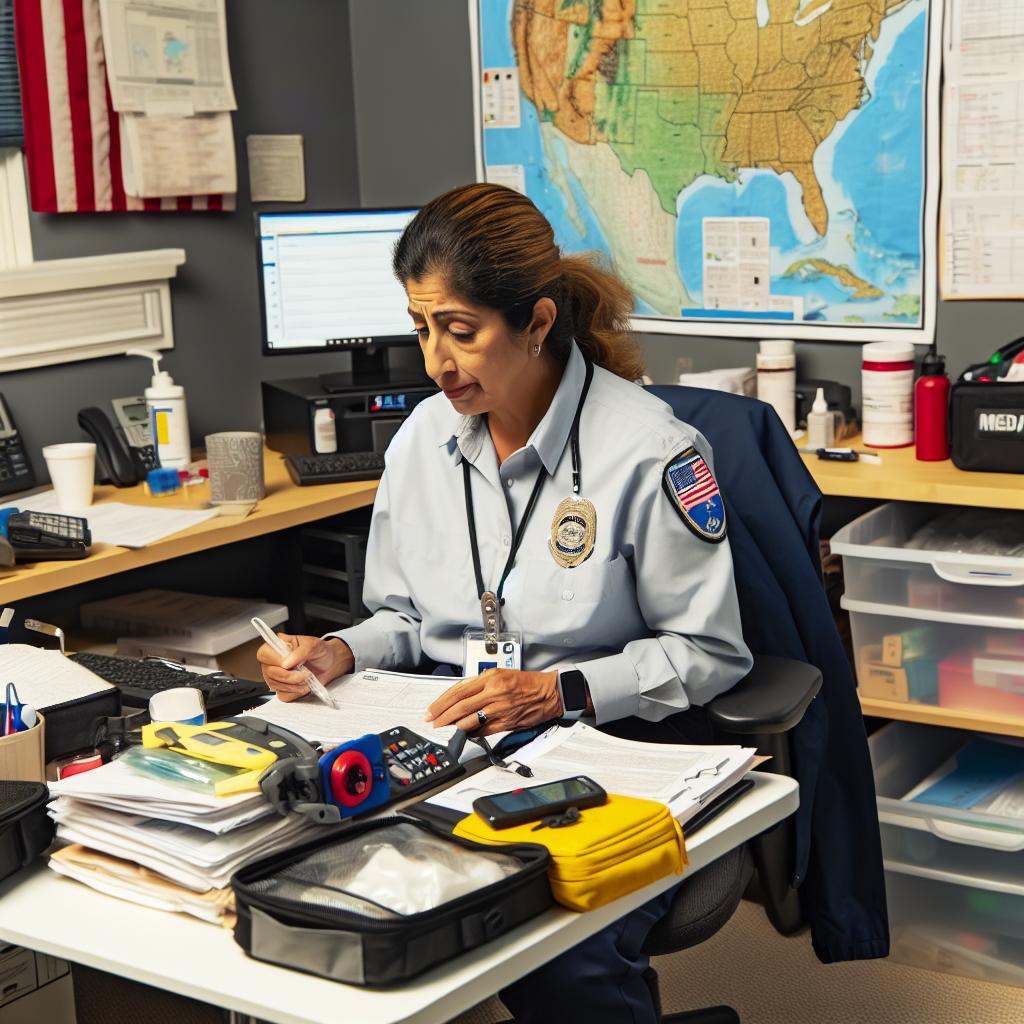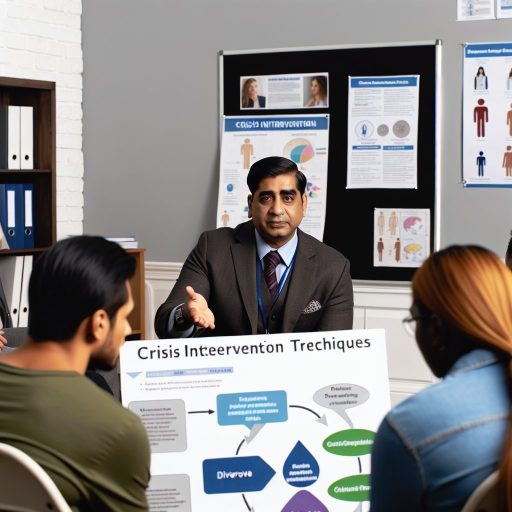Introduction
Public health social work plays a crucial role in ensuring the well-being of individuals and communities during emergencies.
Emergency preparedness is essential for minimizing risks and ensuring a coordinated response.
In this blog post, we will delve into the significance of public health social work in emergency preparedness.
We will discuss the role of social workers in promoting community resilience and preparedness, building partnerships with other agencies, and addressing the social determinants of health.
The role of public health social workers
Definition and responsibilities of public health social workers
Public health social workers are professionals who work within communities to promote health and well-being.
They focus on addressing social determinants of health such as poverty, access to healthcare, and social support systems.
Responsibilities of public health social workers include:
- Assessing the needs of individuals and communities to determine health priorities.
- Developing and implementing programs to address social determinants of health.
- Providing counseling and support to individuals and families facing health challenges.
- Educating communities on health promotion and disease prevention.
- Advocating for policies that improve access to healthcare and social services.
How they work towards preventing and controlling disease outbreaks
Public health social workers play a critical role in preventing and controlling disease outbreaks by addressing the social factors that contribute to the spread of infectious diseases.
Some ways in which they work towards this goal include:
- Identifying populations at risk of disease outbreaks and developing targeted interventions.
- Collaborating with healthcare providers, government agencies, and community organizations to implement preventative measures.
- Providing support to individuals and families affected by disease outbreaks, including mental health services and access to resources.
- Educating communities on the importance of vaccination, hygiene practices, and other preventative measures.
- Advocating for policies that promote access to healthcare and reduce disparities in health outcomes.
Emergency Preparedness in Public Health
Emergency preparedness is a critical aspect of public health that involves planning, organizing, and training to effectively respond to emergencies.
Public health professionals play a vital role in ensuring communities are ready to address various crises and disasters.
Importance of Being Prepared for Emergencies in Public Health
- Timely Response: Being prepared ensures timely response to emergencies, which can help minimize the impact on public health.
- Resource Allocation: Preparedness allows for efficient allocation of resources to address the needs of the community during emergencies.
- Community Resilience: Being prepared fosters community resilience by empowering individuals and organizations to respond effectively to emergencies.
- Prevention of Spread: Preparedness efforts can help prevent the spread of diseases and reduce the risk of secondary health issues.
- Coordination: Effective emergency preparedness promotes coordination among various stakeholders, including healthcare providers, government agencies, and community organizations.
Examples of Emergencies that Public Health Professionals Need to be Ready for
- Natural Disasters: Public health professionals must be prepared for emergencies such as hurricanes, earthquakes, floods, and wildfires.
- Infectious Disease Outbreaks: With the threat of pandemics like COVID-19, public health professionals need to be ready to respond to infectious disease outbreaks.
- Bioterrorism: Public health professionals must be prepared to address the potential threat of bioterrorism, including the release of biological agents.
- Chemical Spills: Professionals in public health should be equipped to handle emergencies involving chemical spills and toxic exposures.
- Mass Casualty Incidents: Being ready for mass casualty incidents, such as terrorist attacks or accidents, is essential for public health professionals.
Emergency preparedness is a crucial aspect of public health that requires proactive planning and collaboration among various stakeholders.
By being prepared for emergencies, public health professionals can effectively protect and promote the health and well-being of communities.
Learn More: The Role of Health Educators in Disease Prevention
Collaboration with other agencies
How public health social workers collaborate with emergency response agencies
Public health social workers play a vital role in collaborating with emergency response agencies during times of crisis and disaster.
They bring a unique set of skills and expertise to the table, helping to ensure that the needs of vulnerable populations are met and that communities are able to recover quickly and effectively.
One of the ways in which public health social workers collaborate with emergency response agencies is by providing mental health support to individuals and families affected by disaster.
They are trained to offer counseling services, crisis intervention, and support to help people cope with the trauma and stress of a crisis situation.
Additionally, public health social workers work closely with emergency response agencies to ensure that resources are allocated properly and that the most vulnerable members of the community are able to access the support they need.
They help to identify at-risk populations, develop targeted interventions, and advocate for policies that promote equity and social justice.
Transform Your Career Today
Unlock a personalized career strategy that drives real results. Get tailored advice and a roadmap designed just for you.
Start NowPublic health social workers also play a key role in community engagement and education during times of emergency.
They work to build relationships with community members, organizations, and other stakeholders to improve communication, build trust, and ensure that important information is disseminated quickly and effectively.
Importance of working together for effective disaster response
Collaboration between public health social workers and emergency response agencies is essential for effective disaster response for several reasons.
First and foremost, public health social workers bring a unique perspective to the table, one that focuses on addressing the social determinants of health and promoting equity and social justice.
By working together, public health social workers and emergency response agencies are able to identify and address the needs of the most vulnerable members of the community.
This ensures that resources are allocated in a way that is fair and just, and that everyone has access to the support they need to recover from a disaster.
Additionally, collaboration between public health social workers and emergency response agencies helps to improve communication and coordination during times of crisis.
By working together, these two groups are able to share information, coordinate efforts, and ensure that everyone is on the same page when it comes to responding to a disaster.
Overall, collaboration between public health social workers and emergency response agencies is crucial for effective disaster response.
By working together, these two groups are able to leverage their respective skills and expertise to ensure that communities are able to recover quickly and effectively from any crisis or disaster.
Delve into the Subject: How Adoption Counselors Prepare Families for Adoption
Training and education requirements
Qualifications needed to work in public health social work and emergency preparedness:
- Bachelor’s degree in social work or related field
- Master’s degree in social work or public health
- Experience in emergency management or disaster response
- Strong communication and interpersonal skills
- Knowledge of community resources and public health practices
Available training programs for those interested in the field:
- Master of Social Work (MSW) programs with a focus on public health
- Emergency preparedness and disaster response certificate programs
- Online courses on public health social work and emergency management
- Advanced training in crisis intervention and trauma-informed care
- Continuing education opportunities in disaster preparedness and response
In order to work in public health social work and emergency preparedness, individuals must meet certain qualifications and undergo specific training programs to develop the necessary skills and knowledge required for the field.
To start a career in public health social work and emergency preparedness, a bachelor’s degree in social work or a related field is typically required. This foundational education provides a solid understanding of social work principles and prepares individuals for further specialization in public health and emergency management.
For those looking to advance their career and take on more responsibility in the field, a master’s degree in social work or public health is often necessary. These advanced programs equip professionals with the skills needed to address complex public health issues, develop intervention strategies, and collaborate with multidisciplinary teams in emergency response situations.
Additionally, experience in emergency management or disaster response is highly valuable for professionals working in public health social work and emergency preparedness. This hands-on experience allows individuals to apply their knowledge in real-world settings, respond effectively to crises, and support communities in times of need.
Strong communication and interpersonal skills are also essential for success in this field. Public health social workers and emergency preparedness professionals must be able to effectively communicate with diverse populations, build rapport with community members, and collaborate with agencies and organizations to coordinate emergency response efforts.
Furthermore, a good understanding of community resources and public health practices is critical for professionals in public health social work and emergency preparedness. By staying informed about local resources, services, and public health initiatives, professionals can better support the health and well-being of individuals and communities during emergencies.
For individuals interested in pursuing a career in public health social work and emergency preparedness, there are various training programs available to help them develop the necessary skills and knowledge for success in the field.
Master of Social Work (MSW) programs with a focus on public health offer specialized coursework in areas such as epidemiology, health policy, and community health promotion. These programs prepare students to address public health challenges, work with vulnerable populations, and advocate for social justice in health care settings.
Showcase Your Business Today
Reach thousands of readers actively exploring professional services. Publish your business profile and grow your audience now.
Publish NowAdditionally, emergency preparedness and disaster response certificate programs provide targeted training in crisis management, emergency planning, and disaster recovery. These programs equip professionals with the skills needed to assess risks, develop response plans, and coordinate resources during emergencies.
Online courses on public health social work and emergency management offer flexible learning options for individuals looking to enhance their knowledge and skills in the field. These courses cover topics such as crisis intervention, trauma-informed care, and disaster preparedness, providing valuable insights into best practices and strategies for supporting communities in times of crisis.
Furthermore, advanced training opportunities in crisis intervention and trauma-informed care can help professionals deepen their expertise in supporting individuals and communities during emergencies. These training programs provide specialized instruction on managing mental health issues, providing emotional support, and promoting resilience in emergency situations.
Continuing education opportunities in disaster preparedness and response allow professionals to stay current on emerging trends, best practices, and research in the field. By participating in workshops, conferences, and seminars, professionals can expand their knowledge, network with peers, and contribute to ongoing efforts to improve emergency preparedness and response strategies.
Delve into the Subject: Addressing Social Skills in Life Skills Instruction
During public health emergencies, professionals face various challenges that can hinder effective response.
It is crucial to identify these obstacles and implement strategies to overcome them in order to mitigate the impact of emergencies.
Common challenges faced by public health professionals during emergencies
- Lack of resources: Public health agencies may have limited funding, personnel, and supplies to respond adequately to emergencies.
- Communication barriers: Inconsistent messaging or difficulties in reaching affected populations can impede response efforts.
- Coordination issues: Collaboration between various agencies, organizations, and stakeholders may be challenging, leading to disjointed response efforts.
- Information overload: Sorting through massive amounts of data and misinformation can slow down decision-making processes.
- Community resistance: Some individuals may be reluctant to comply with public health measures, hindering effective response.
Strategies for overcoming these challenges
- Resource mobilization: Leveraging partnerships, requesting additional funding, and activating mutual aid agreements can help address resource limitations.
- Establishing clear communication channels: Utilizing various communication platforms and ensuring consistent messaging can enhance information dissemination.
- Creating a unified command structure: Developing a clear hierarchy and assigning roles and responsibilities can improve coordination among response partners.
- Utilizing data management systems: Implementing data analytics tools and information sharing platforms can streamline data processing and analysis.
- Engaging with communities: Building trust, fostering relationships, and addressing concerns can help overcome resistance and increase community cooperation.
By recognizing these challenges and implementing effective strategies, public health professionals can enhance their emergency response capabilities and better protect the health and well-being of the communities they serve.
Uncover the Details: The Future of School Social Work: Trends and Predictions

Case studies and success stories
Public health social workers play a critical role in emergency preparedness and response.
They are at the forefront of addressing public health emergencies and disasters.
They work in collaboration with other stakeholders to ensure the safety and well-being of communities.
In this section, we will explore real-life examples of successful public health emergency responses and lessons learned from past emergencies.
Real-life examples of successful public health emergency responses
- During the Ebola outbreak in West Africa, public health social workers played a key role in educating communities about the disease, providing psychosocial support to affected individuals, and coordinating with other agencies to ensure a coordinated response.
- In the aftermath of Hurricane Katrina, public health social workers worked tirelessly to provide mental health services to survivors, address food and housing insecurity, and advocate for the needs of vulnerable populations.
- Following the 2010 earthquake in Haiti, public health social workers were instrumental in coordinating relief efforts, providing medical care to injured individuals, and supporting the rebuilding of healthcare infrastructure in the affected areas.
- During the COVID-19 pandemic, public health social workers have been actively involved in contact tracing, providing support to individuals in quarantine or isolation, and addressing the mental health impacts of the crisis on communities.
Lessons learned from past emergencies
- Effective communication and collaboration among stakeholders are essential for a successful public health emergency response.
- Public health social workers should work closely with government agencies, healthcare providers, and community organizations to ensure a coordinated and efficient response.
- Building strong relationships with communities is crucial for effective emergency preparedness.
- Public health social workers should engage with community members, understand their needs and concerns, and involve them in the planning and implementation of response efforts.
- Investing in training and capacity-building for public health social workers is essential for ensuring a timely and effective response to emergencies.
- Continuous education and professional development help social workers stay updated on best practices and guidelines for emergency preparedness and response.
- Addressing the social determinants of health is key to improving the resilience of communities in the face of emergencies.
- Public health social workers should advocate for policies that address issues such as poverty, housing instability, and lack of access to healthcare, which can exacerbate the impacts of emergencies on vulnerable populations.
By learning from past emergencies and implementing best practices in public health emergency preparedness and response, public health social workers can play a vital role in protecting the health and well-being of communities in times of crisis.
Community involvement in emergency preparedness.
- The role of community members in preparing for and responding to emergencies.
- How public health social workers engage with communities to improve emergency response.
Emergencies can happen at any time.
It is essential for communities to be prepared to respond effectively.
Community involvement plays a crucial role in ensuring that everyone is ready to face any emergencies that may arise.
Here we will discuss the role of community members in preparing for and responding to emergencies, as well as how public health social workers work with communities to enhance their emergency response capabilities.
The role of community members in preparing for and responding to emergencies
Community members are the first responders in any emergency situation.
They play a critical role in preparing for emergencies by educating themselves on potential hazards, developing emergency plans, and participating in drills and exercises.
During an actual emergency, community members are relied upon to take necessary actions to safeguard themselves and others, provide assistance to those in need, and cooperate with emergency responders.
Some ways in which community members can contribute to emergency preparedness include:
- Attending training sessions to learn about different types of emergencies and how to respond.
- Participating in local emergency planning committees to provide input on community needs and resources.
- Volunteering with organizations that focus on disaster response and recovery efforts.
- Sharing information with neighbors and community members about emergency preparedness best practices.
- Being proactive in securing their homes and neighborhoods against potential hazards.
How public health social workers engage with communities to improve emergency response
Public health social workers play a crucial role in enhancing community resilience and emergency response capabilities.
They work closely with communities to identify vulnerabilities, develop emergency plans, and provide resources and support to ensure that individuals and families are prepared for emergencies.
Some strategies that public health social workers use to engage with communities in improving emergency response include:
- Conducting community assessments to identify at-risk populations and areas that may need additional support.
- Facilitating community workshops and training sessions on emergency preparedness and response.
- Collaborating with local agencies and organizations to create a network of support and resources for emergencies.
- Advocating for policies and programs that promote community resilience and emergency preparedness.
- Providing mental health support and counseling services to individuals and families affected by emergencies.
Community involvement is essential in building strong and resilient communities that can effectively respond to emergencies.
Public health social workers play a vital role in engaging with communities to enhance their emergency preparedness and response capabilities, ultimately ensuring the safety and well-being of all community members.
Public Health Social Work and Emergency Preparedness
Recap of key points discussed in the blog post:
Public health social work plays a crucial role in emergency preparedness.
This role focuses on community empowerment, advocacy, and support for vulnerable populations.
Social workers help address social determinants of health.
They ensure equitable access to resources during emergencies.
These emergencies can include natural disasters or pandemics.
Final thoughts on the importance of public health social work and emergency preparedness:
Public health social work is essential in building resilient communities.
These communities can effectively respond to and recover from emergencies.
By addressing social disparities, social workers promote health equity.
This contribution leads to a more inclusive and sustainable approach to emergency preparedness.
It is crucial to recognize the value of integrating social work principles.
Showcase Your Business Today
Reach thousands of readers actively exploring professional services. Publish your business profile and grow your audience now.
Publish NowThese principles should be part of public health emergency response efforts.
Such integration ensures comprehensive and holistic support.
Support for individuals and communities is vital in times of crisis.
Additional Resources
Minnesota Department of Human Services / Minnesota Department …
Office of Human Services Emergency Preparedness and Response …
[E-Books for Sale]
The Big Book of 500 High-Paying Jobs in America: Unlock Your Earning Potential
$19.99 • 500 High-Paying Jobs • 330 pages
Explore 500 high-paying jobs in America and learn how to boost your career, earn more, and achieve success!
See All 500 High-Paying Jobs of this E-Book
1001 Professions Without a Degree: High-Paying American Jobs You Can Start Now
$19.99 • 1001 Professions Without a Degree • 174 pages
Discover 1001 high-paying jobs without a degree! Unlock career tips, skills, and success strategies for just $19.99!




